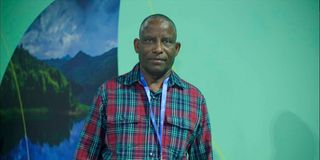From Marsabit to Baku in search of climate justice, but nothing to write home about

Patrick Katelo, head of the Pastoralist Community Initiative and Development Assistance, in Baku, Azerbaijan.
What you need to know:
- "For the last 20 years, I have seen leaders and governments make empty promises, even as those of us from pastoralist communities continue to bear the brunt of a climate catastrophe we did not bring upon ourselves."
In Baku, Azerbaijan
Patrick Katelo, a climate advocate from Marsabit County, is among Kenyans attending the COP29 climate summit in Baku, Azerbaijan.
Mr Katelo, who heads the Pastoralist Community Initiative and Development Assistance (Pacida), an organisation that empowers pastoralist communities through sustainable community-driven development interventions in Marsabit, Turkana, West Pokot, Samburu as well as some parts of Ethiopia that are highly impacted by the devastating effects of the climate crisis, shares his thoughts on the state of global climate action.
“This is my fifth time attending a Conference of Parties (COP) meeting.
I have also attended more than 100 United Nations (UN) climate change meetings. However, there is nothing to write home about as tangible progress remains elusive. The lack of substantial achievements in addressing the climate crisis leaves me feeling disheartened even as I reflect on the urgent need for more effective solutions.
For the last 20 years, I have seen leaders and governments make empty promises, even as those of us from pastoralist communities continue to bear the brunt of a climate catastrophe we did not bring upon ourselves.
I am so tired because when I started listening to and clapping heartily for leaders who assured us that these promises would then be met as a matter of priority, the hair on my head hadn’t started greying.
The zeal
I was then a young environment activist and, like the rest of the thousands of delegates from around the world at the time, I was full of optimism and zeal to be the voice of my community. The leaders were initially honest and genuine about combating the climate crisis.
But over the years, geopolitical interests became deep-rooted, with even the rich polluters becoming selfish and arrogant and, at a point, totally refusing to pay up.
I can’t imagine that 20 years later, many of my people are yet to understand climate change. There is very little knowledge among the pastoralist communities on what is causing the endless droughts that have plagued our lands for years, obliterating our grazing fields.
The so-called climate solutions presented every year at COP have never trickled down to the grassroots. In fact, the situation is worse than these COP meetings found us.
For example, in Turkana, Kenya’s Ministry of Petroleum and Mining watched as oil merchants backed by the fossil fuel industry raided our lands to drill and take oil away, thereby exposing us to loss of pasture land, contamination of underground water, land and air pollution.
The oil merchants have also dug pits that are now breeding grounds for mosquitoes, thereby exposing us to malaria, one of the leading killers of our children.
It is sad to sit and watch generations being wiped out like this. Studies show that synthetic material used in oil drilling has contaminated underground water, leading to a spike in cancer cases, further burdening our healthcare systems.
In Marsabit, experts have attributed rising cancer cases to Dadach boche, an open illegal dumpsite that serves the town and its environs. Garbage burning adds significantly to air pollution, making the area unhabitable.
The 2019 State of Global Air report observed that air pollution is the eighth leading risk factor for premature death, accounting about seven per cent of deaths– nearly 19,000 – in Kenya in 2017 alone.
Air pollution exposure, including exposure to outdoor particulate matter (PM2.5), and household air pollution, have been linked to increased hospitalisations, disability, and early death from respiratory diseases, heart disease, stroke, lung cancer, and diabetes, as well as communicable diseases like pneumonia.
While in Baku, I asked myself, what is the point of attending COP every year when no one pays attention and does something about the predicament we the marginalised pastoralist communities are having to deal with?
It is sad and unfortunate that food and water are still a major problem among pastoralist communities in 2024.
When will we ever get the COP outcomes we want and have laboured for all these years considering the fact that we are not to blame for what is happening?
All hope is, however, not lost.
The best thing we can do at the moment is to prioritise sentising pastoralist communities as well as the younger generation about the devastating impacts of climate change; hoping that they will live to take over and fight for Mother Nature. Education remains the most potent tool out of this mess.”





